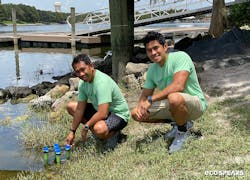Norwegian Katapult Ocean Invests in ecoSPEARS Clean Water Technology
ORLANDO, FL — Polychlorinated Biphenyls (PCBs) and other Persistent Organic Pollutants (POPs) contaminate many US rivers and streams and are incredibly challenging to remove. When these contaminants remain in the environment, they can cause congenital disorders and diseases to animals and people. ecoSPEARS is a cleantech company with NASA-developed green remediation technology that extracts and destroys toxins from land waterways and was recently selected for investment from Norwegian sustainable ocean fund and accelerator Katapult Ocean.
In the selection process, Katapult Ocean screened and interviewed a pipeline with more than 1,500 startups. Since 2018, Katapult Ocean has made 32 investments in exciting ocean impact companies from all over the world (17 countries and four continents). "Few options exist when it comes to eliminating persistent and emerging contaminants in soil, sediment, and oil—a problem which has grown with industry globally. ecoSPEARS is well-positioned to become the benchmark cleantech company for green remediation," said Jonas Skattum Svegaarden, CEO of Katapult Ocean.
ecoSPEARS realizes that partnerships will be vital to achieving its goal to provide access to clean water, clean food, and clean air. "We are thrilled to be selected into Katapult Ocean Wave 3 and the Norwegian startup community. Now, more than ever, we must restore the health of the world's waters to protect people, wildlife, and the environment. Our partnership with Katapult Ocean will help us scale our remediation technologies to Europe and beyond," said Sergie Albino, CEO and co-founder of ecoSPEARS.
Compared to landfilling and incineration methods, ecoSPEARS eliminates toxins with a more eco-friendly and cost-effective approach. ecoSPEARS extracts and destroys Polychlorinated biphenyls (PCBs), dioxins, and other Persistent Organic Pollutants (POPs) utilizing non-thermal technology. Its solutions reduce CO2 emissions by up to 75%, uses virtually no water, and minimizes the creation of harmful byproducts compared to alternative methods. The technologies are being developed as scalable and modular systems and are currently advancing to on-site pilot deployment.
"PCBs and dioxins are cancer-causing toxins impacting hundreds of millions of people worldwide. According to the United Nations, 90 years later, PCBs are still the most widespread contaminant globally. We know that we are taking on a massive undertaking, but our team is bold and more than capable. Plus, everyone loves a good underdog story," said Ian Doromal, EVP and co-founder.


